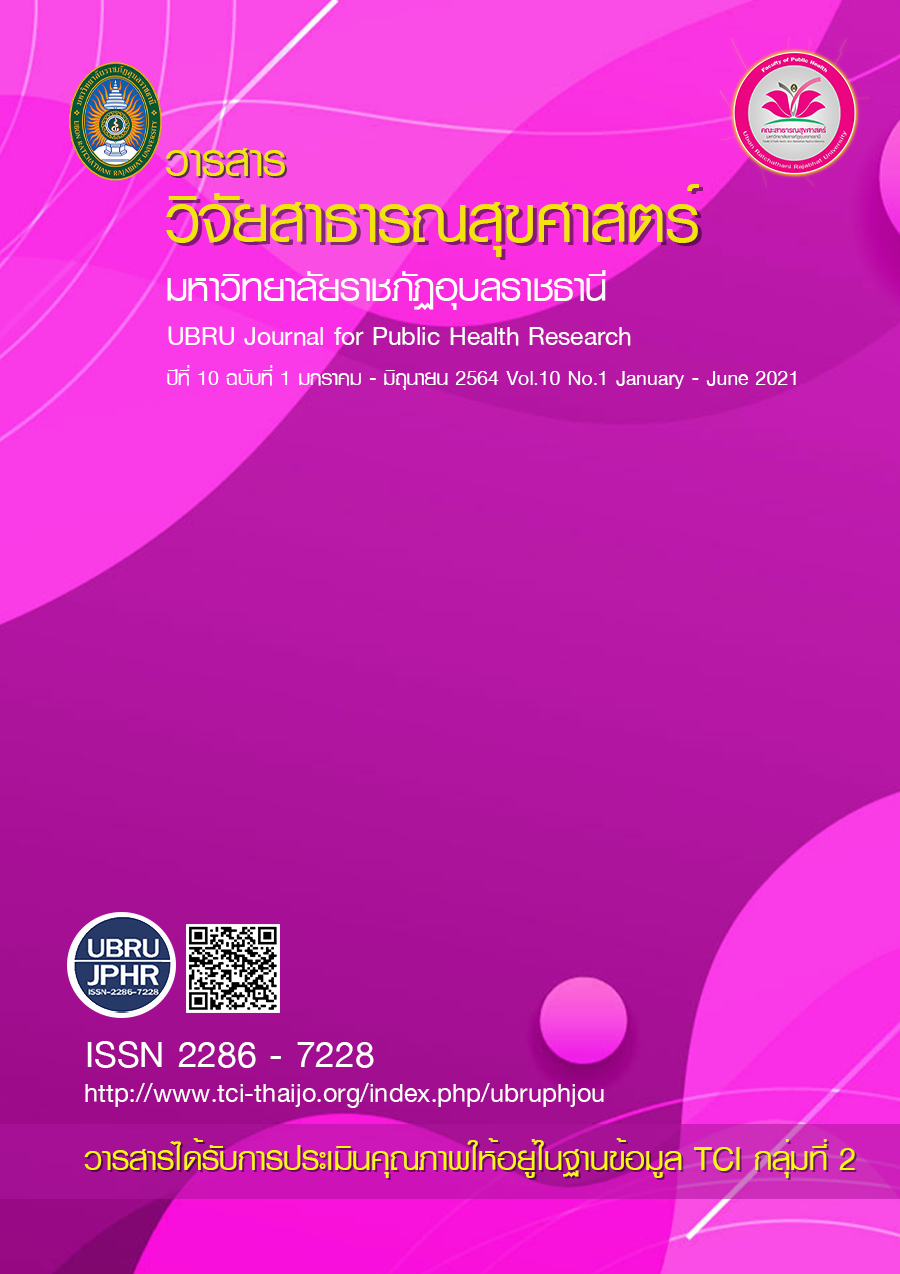A study of the first-year student of bachelor degree of nursing on the life’s skills module learning outcomes at Boromarajonani College of Nursing, Nakhon Si Thammarat
Keywords:
Learning outcomes, life’s skill, Bachelor Degree of Nursing StudentAbstract
This study aims to study the learning outcomes, the satisfaction of leaning processes, and factors which affected the outcomes on life’s skills module. This study was conducted in Boromarajonani College of Nursing, Nakhon Si Thammarat, of which the first-year students were 100 participants were eligible in total. Data were analyzed by statistics descriptive and stepwise multiple regression analysis. The results showed that (1)The level of achievement in learning was found that the great number of achievement level was at a low level, then good and modest level respectively.(2)The findings on the satisfaction of the life’s skills module was high level (=4.27+0.42). Considerate on each aspect, it was found that all aspects were high level, by the teachers had great of average score, next was measurement and evaluation of the module, For the learning processes and the additional activities and 4.31+0.48 respectively. And the module. While the resources and the environment have the lowest average score (=4.10+0.51) (3) There were no independent factor influence learning outcomes. The results that derived from the group discussion, show that life’s skill module seems to be a basic module, of which the module characteristics was similar as social study or good citizen. However, it was different in a depth of contents and latest content of knowledge, therefore, the teachers were asked for the explanation and clarification on the objectives by most students, evaluation, score evaluated the PROJECT BASED relatively high, which would help students to get better scores, besides, it should be focused on practical activities rather than learning the theory as the teachers proposed the simulation learning for better understanding.
The recommendation of the researcher should give the details of the course, Moreover, theoretical lecture should be provided along with the project, budget should be allocated sufficiently for the final project and continue follow the achievement of each learning outcome periodically in order to improve learning achievement in the students.
References
กระทรวงศึกษาธิการ. (2560). เกณฑ์มาตรฐานหลักสูตรระดับอุดมศึกษา พ.ศ.2558 และเกณฑ์มาตรฐานที่เกี่ยวข้อง. กรุงเทพฯ: บริษัท วงศ์สว่างพับลิชชิ่ง แอนด์ พริ้นติ้ง จำกัด.
คณะกรรมาธิการนานาชาติว่าด้วยการศึกษาในศตวรรษที่ 21. (2551). การเรียนรู้: ขุมทรัพย์ในตน =learning: the treasure within. กรุงเทพฯ : สำนักงานคณะกรรมการการศึกษาแห่งชาติ.
ฉัตรแก้ว เภาวิเศษ และวรรณวิภา จัตุชัย (2557). ปัจจัยที่ส่งผลต่อผลสัมฤทธิ์ทางการเรียนของนักศึกษาหลักสูตรภาษาอังกฤษ คณะมนุษยศาสตร์ และสังคมศาสตร์ มหาวิทยาลัยราชภัฏสวนดุสิต. วารสารบริหารการศึกษาบัวบัณฑิต. 14(1), 45-61.
ณิรัชกร ทองน้อย และบุญชม ศรีสะอาด. (2558). การพัฒนาระบบการจัดกระบวนการเรียนรู้ที่มีประสิทธิผลในโรงเรียนประถมศึกษา. วารสารการวัดผลการศึกษา มหาวิทยาลัยมหาสารคาม. 21(2). 413-427.
ทวนทอง เชาวกีรติพงศ์ และสมชัย วงษ์นายะ. (2561). ปัจจัยที่ส่งผลต่อผลสัมฤทธิ์ทางการเรียนของนักศึกษาครุศาสตร์ มหาวิทยาลัยราชภัฏกำแพงเพชร. วารสารมนุษศาสตร์และสังคมศาสตร์. 24(พิเศษ), 103-113.
มิดา คงเขตวณิช. (2556). การศึกษาความคาดหวังและความพึงพอใจของนักศึกษาระดับปริญญาตรีที่มีต่อการเรียนการสอนวิชาการบัญชีการเงินของมหาวิทยาลัยศรีปทุม. การประชุมวิชาการวิชาการระดับชาติ มหาวิทยาลัยศรีปทุม ประจำปี 2556 (น.193). กรุงเทพฯ: มหาวิทยาลัยศรีปทุม.
วิทยาลัยพยาบาลบรมราชชนนี นครศรีธรรมราช. (2562). คู่มือบริหารหลักสูตร พ.ศ.2562. นครศรีธรรมราช.
วิรัช วรรณรัตน์. (2560). ศักยภาพผลการเรียนรู้ของบัณฑิตผู้สำเร็จการศึกษา หลักสูตรประกาศนียบัตรบัณฑิตวิชาชีพครู มหาวิทยาลัยราชพฤกษ์ ปีการศึกษา 2557-2559. มหาวิทยาลัยราชพฤกษ์.
สมใจ พุทธาพิทักษ์ผล, บุญทิพย์ ศิริธรังศรี และดวงกมล ปิ่นเฉลี่ยว. (2556). การศึกษาความพึงพอใจของนักศึกษามหาวิทยาลัยสุโขทัยธรรมาธิราชที่มีต่อการเรียน การสอน ชุดวิชา 51712 สัมมนาประเด็นและแนวโน้มการบริหารการพยาบาล. วารสารอิเล็กทรอนิกส์การเรียนรู้ทางไกลเชิงนวัตกรรม. 3(1), 32-50.
สมภพ กาญจนะ และเผ่าไทย วงศ์เหลา (2560). ปัจจัยที่ส่งผลต่อผลสัมฤทธิ์ทางการเรียนวิชาแคลคูลัส 1 ของนักศึกษามหาวิทยาลัยราชภัฏบุรีรัมย์. วารสารรมยสาร. 15(2), 207-214.
สำรวย กมลายุตต์ (2555). ความพึงพอใจที่มีต่อการเรียนการสอนผลการเรียนรู้ตาม มคอ.3 และความต้องการความช่วยเหลือของนักศึกษาที่ลงทะเบียนเรียนชุดวิชา 13413 เทคโนโลยีสารสนเทศเบื้องต้น ภาคการศึกษาที่ 1/2554. วารสารอิเล็กทรอนิกส์การเรียนรู้ทางไกลเชิงนวัตกรรม. 2(1), 196-210.
สุกฤตา เส็งเข้ม, สำราญ มีแจ้ง และเทียมจันทร์ พานิชย์ผลินไชย. (2556). ปัจจัยที่ส่งผลต่อผลสัมฤทธิ์ทางการเรียนของนิสิตคณะทันตแพทยศาสตร์ มหาวิทยาลัยนเรศวร. วารสารมหาวิทยาลัยนเรศวร. 21(3), 79-91.
สุภาวดี สุวิธรรมา. (2561). ปัจจัยที่ส่งผลต่อผลสัมฤทธิ์ทางการเรียนวิชาสถิติธุรกิจของนักศึกษา มหาวิทยาลัยราชภัฏนครราชสีมา. วารสารศึกษาศาสตร์ มหาวิทยาลัยสงขลานครินทร์. 29(1), 55-69.
อารี ชีวเกษมสุข. (2556). ความพึงพอใจของนักศึกษาต่อการเรียนการสอนชุดวิชา 51711 การจัดการคุณภาพการพยาบาลหลักสูตรพยาบาลศาสตรมหาบัณฑิต แขนงวิชาการบริหารการพยาบาล มหาวิทยาลัยสุโขทัยธรรมมาธิราช ประจำปีการศึกษา 2554. วารสารอิเล็กทรอนิกส์การเรียนรู้ทางไกลเชิงนวัตกรรม. 3(1), 107-121
Best, J.W. (1977). Research in Education. 3nded. Englewod cliffs: N.J. Prentice-Hall.
Bloom, B.S. et al. (1982). Human Characteristics and School Learning. New York: Mcgraw-Hill.
Downloads
Published
How to Cite
Issue
Section
License
เนื้อหาและข้อมูลในบทความที่ลงตีพิมพ์ในวารสารวารสารวิจัยสาธารณสุขศาสตร์ มหาวิทยาลัยราชภัฏอุบลราชธานี ถือเป็นข้อคิดเห็นและความรับผิดชอบของผู้เขียนบทความโดยตรงซึ่งกองบรรณาธิการวารสาร ไม่จำเป็นต้องเห็นด้วย หรือร่วมรับผิดชอบใดๆ
บทความ ข้อมูล เนื้อหา รูปภาพ ฯลฯ ที่ได้รับการตีพิมพ์ในวารสารนี้ ถือเป็นลิขสิทธิ์ของวารสารฯ หากบุคคลหรือหน่วยงานใดต้องการนำทั้งหมดหรือส่วนหนึ่งส่วนใดไปเผยแพร่ต่อหรือเพื่อกระทำการใดๆ จะต้องได้รับอนุญาตเป็นลายลักอักษรณ์จากบรรณาธิการวารสารนี้ก่อนเท่านั้น


